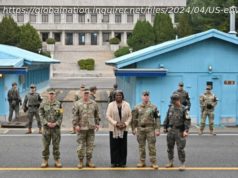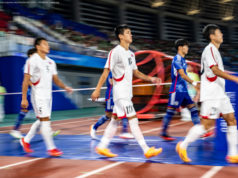KCON, an annual event in its third year in New Jersey, tries to make the global phenomenon of the South Korean pop music scene feel like an intimate subculture.
NEWARK — That K-pop — the pop music scene that dominates South Korea and, increasingly, the rest of the world — has not yet had a chart-topping, cross-cultural “Despacito” moment in this country is vexing. The affinities are natural — the music is thick with references to American pop, hip-hop and R&B. And it’s both decadently visual and relentlessly energetic, in a way that needs no translation.
K-pop continues to embody all of this potential, as was clear on Saturday, the second day of KCON, an annual festival — this was its third year here, and it will come to Los Angeles for the sixth time in August — that tries to make a global phenomenon feel like an intimate subculture, and underscores why that strategy is a savvy one.
All day and night, through panels, workshops, dance-alongs and opportunities to meet stars and, finally, a concert, KCON made an effort to condense this huge scene into a series of small, consumable gestures. This was the case even in the most choreographed moments — on the red carpet, where the pop stars dutifully took turns facing each part of the room, so different swaths of screaming fans could get great shots; and during the show, where groups like Twice and NCT 127 interrupted their tightly structured sets for fan interactions (also preplanned, but still effective) .
NCT 127, which released its debut EP only last summer, was the highlight of the concert — their hits, including “Fire Truck” and “Cherry Bomb, ” are flamboyantly chaotic and unerringly entertaining. The concert also featured the boy band UP10TION and Twice, a squeaky-clean girl group. (The most intriguing artist on the Friday night bill was the singer/rapper Zion. T.)
KCON is set up to take advantage of the intimacy and fluidity of this still-growing scene (in this country at least) in which superfans — the closest observers — are the real experts. Many of the afternoon panelists were YouTubers, fans themselves who were probably only a couple of years removed from being just regular attendees. On one afternoon panel, “Storytime: I Met My Idol!, ” a handful of them related giggly tales of offhand conversations in elevators, or of simply locking eyes with their favorite singer. And at least a couple of the day’s panelists were also in the press pit at the red carpet, shooting photos for their websites.
The K-pop world has developed its own lingo: “hi-touch, ” a way for artists and fans to connect quickly, a sort of extended high-five; “bias, ” the member of a K-pop group that you favor; and so on. Much of KCON is devoted to efforts at fan education and inclusion, especially during the daytime part of the festival — a dance floor was set up so fans could recreate the moves from their favorite K-pop videos en masse, and at the myriad sponsor tents, teenage fans sang and danced along to hits like BTS’s “Blood Sweat & Tears.” Merchandise booths offered cheap ways to show loyalty: posters, stickers, enamel pins, bracelets with stars’ names spelled out in glittery letters.
Most of the extremely diverse fans here were teenagers, not that much younger than the performers onstage. K-pop skews young as a genre — one reason is that South Korea mandates military service for its men, a law that extends even to pop idols. Many in the most recent wave of the genre’s superstars, like the members of BigBang, have recently entered the military, or are about to. Groups like BTS are beginning to fill that void and, if its reception here is any indication, NCT 127 is hot on its heels.
All of which made the headlining performance of CNBLUE all the more curious. Though the group is all-male, it isn’ t a classic boy band; rather it’s a pop-rock band, and all the members, including the charismatic frontman Jung Yong Hwa, played instruments. Of Saturday night’s performers, it was the most established, having been releasing music since 2009. Its music, which had glimmers of Abba and also Phoenix, had little to do with what was happening during the rest of the show.
Its set was colorful, but also loudly served as a reminder of how young everyone else was, and by extension why K-pop hasn’ t been able to gain steady, reliable traction in this country. Just as artists are reaching the peak of their renown, they are snatched away, leaving behind seeds that are only just beginning take root.






